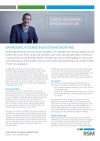The job-related investment allowance (BIK) is a temporary government incentive scheme, designed to ensure that companies continue to invest in new assets, for example, even during these turbulent times. The BIK came into force on 1 January 2021, but also applies to investments committed to as at 1 October 2020 or after.
For the time being, the BIK applies to investments in new assets made in the period from 1 October 2020 to 31 December 2022. Companies that fall under the corporation tax or the income tax regime can offset the BIK against Wage Tax, if certain conditions are met, and, therefore, is only of interest to companies with employees. Because of this system, the benefit of the scheme does not depend on the profit.
What is the BIK?
Under the BIK scheme, 3.9% of the investment amount (for investments up to € 5 million) can be set off against Wage taxes due, until 31 December 2021. In case of a higher investment amount, 1.8% of the excess amount can be set off. The percentages for the year 2022 have not yet been determined. A company may apply for the BIK up to four times per year, with a lower limit of € 20,000 per application and a lower limit of €1,500 per asset.
Various conditions must be met to take advantage of the BIK. An important condition is that the Wage taxes owed are such that the BIK can be fully offset. In addition, the BIK is only intended for investments in new business assets that are used for operating a business. In other words, assets that have not previously been used.
The BIK may be applied for up to 4 times per year and no more than once per quarter. The BIK can be awarded in addition to existing investment schemes, such as the small-scale investment allowance (KIA), the environmental investment allowance (MIA) and the energy investment allowance.
The benefit
The amount of the investment allowance depends on the size of the investments; for investments
- up to € 5 million, the allowance is 3.9% (2021) of the amount invested;
- above € 5 million, the allowance is 1.8% (2021) of the amount invested in excess of € 5 million.
The government has allocated a budget of four billion euros for the BIK, to be spent in two years. Therefore, the percentages referred to may be adjusted as of 2022. At the end of 2021 it will be estimated to what extent the budget of € 2 billion for 2021 has been used. Depending on the budget still available, the percentages may be increased or decreased as of 2022.
New investments
The BIK only applies to investments in new business assets made on or after 1 October 2020. The investments must have been paid for no later than between 1 January 2021 and 31 December 2022 and must also be put into use within six months of full payment. Some investments are excluded, such as investments in passenger cars not intended for professional transport.
Application of the BIK
The investment allowance is designed as a tax deduction on the Wage taxes owed: the BIK reduction. In the case of a successful application, the Netherlands Enterprise Agency (RVO) determines the amount of the BIK reduction by means of a BIK declaration. This amount can subsequently be deducted from all payroll taxes (wage tax and national insurance contributions) owed in that calendar year.
Applications can be submitted as from 1 September 2021. The RVO is required to decide on an application within 12 weeks, which means that the BIK reduction can be applied for the first time in the last period of 2021. The BIK reduction must be realised in the calendar year in which the BIK declaration is issued by the RVO. The ‘BIK reduction’ is not yet available as a tax reduction in the payroll tax return for the 2021 calendar year, so the ‘maritime tax reduction’ must be used for this purpose. By means of this tax reduction, less payroll tax is owed, effectively resulting in the application of the BIK.
If the entire BIK reduction cannot be offset against the remaining Wage tax returns for the year, a correction to the Wage tax returns already submitted for earlier periods of the relevant year may allow for deduction to still take place, to the extent possible.
Application in the case of a fiscal entity
If there are several withholding agents for corporation tax within a fiscal entity, only the designated BIK withholding agent may submit an application. In the application, the designated withholding agent shall allocate the amount of BIK deduction to be claimed to the withholding agents that are part of the fiscal entity. If this allocation is not included in the application, the total amount of BIK reduction shall be allocated to the designated BIK withholding agent.
Please Note!
The option of taking advantage of the BIK as a fiscal entity still requires the approval from the European Commission. Once approved, the BIK shall also apply to fiscal entities for corporation tax purposes with retroactive effect from
1 January 2021.
TIP
If investments are frequently made by companies within the group other than where the employees are employed, a fiscal entity for corporation tax purposes may be required in order to take advantage of the BIK. In addition, investments in new business assets that are intended primarily (i.e. 70% or more) for the purpose of leasing within the group are excluded from the BIK. A fiscal entity for corporation tax can prevent this. One condition, however, is that this must relate to entirely domestic situations. Incidentally, always pay close attention to all other advantages and disadvantages a formation of a fiscal entity for the levy of corporation tax may entail.
More information?
Would you like more information about the above? Please contact your trusted RSM advisor or send an email to: [email protected].
Download the newsletter 'Job-related investment allowance' in pdf.

